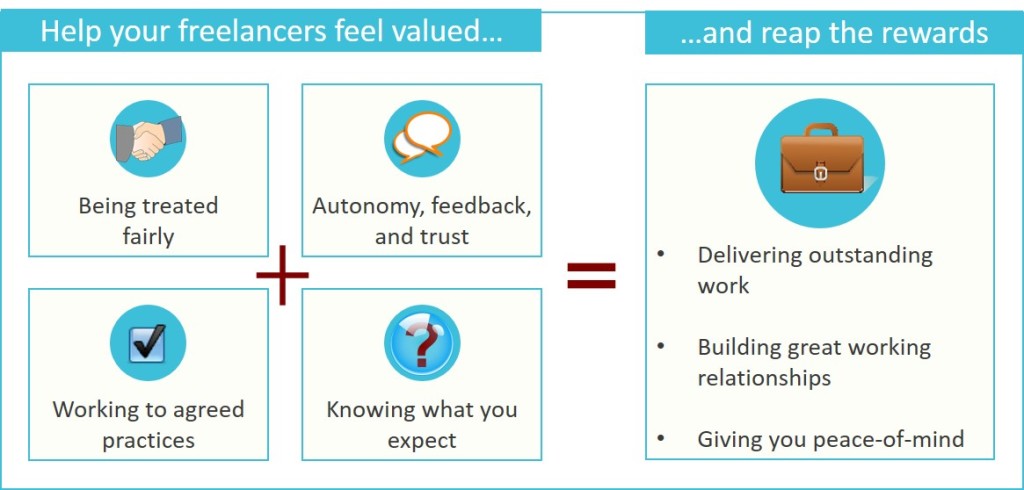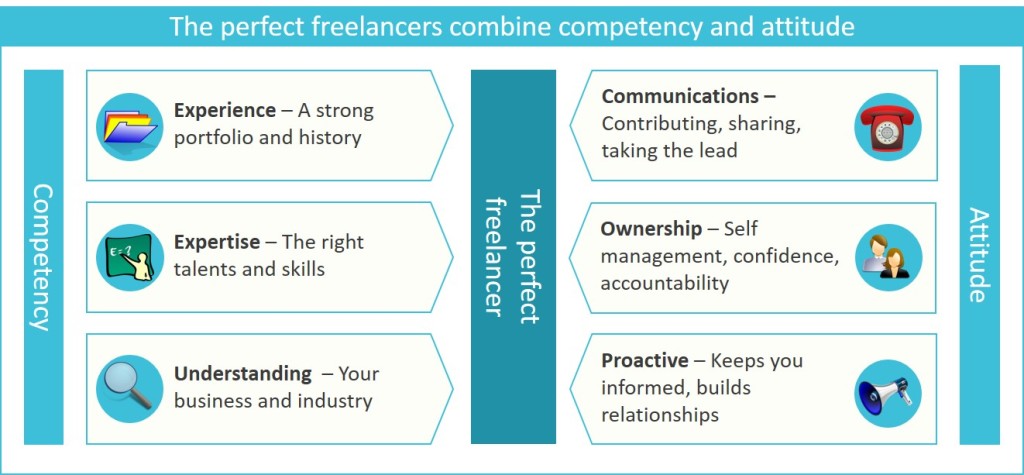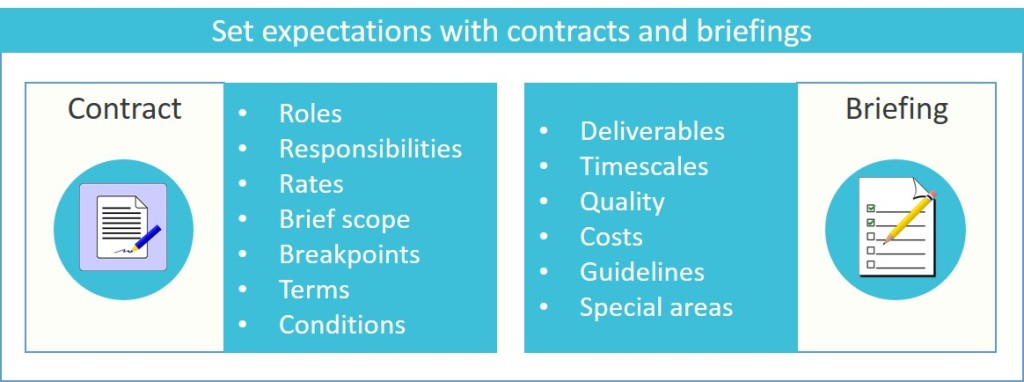The way we work together is changing, with technology making it faster and easier than ever to collaborate with virtual and local teams. Any time a project manager or entrepreneur wants to build something beautiful, they just need to go to an online freelance marketplace, find the right contractors, give them access, and work together to deliver something amazing…
If only it were that simple.
You know it doesn’t quite work that way in the real world. No matter how good a team you have, how powerful your technology is, or how efficiently you work, issues always crop up. These problems are even harder to solve when you’re working across multiple locations.
Fortunately, there are several practical steps you can take to create better working practices, build stronger team relationships, and ultimately help your project to deliver successfully. As a former project manager and an active freelance writer, I’ve seen these techniques work from both sides. It does take effort and commitment to make these changes, but it’s undoubtedly worth it in the long run.
In this article we’ll explore:
- Why it’s vital to value your freelancers.
- Foundations — hiring for attitude.
- Expectations — the importance of writing stuff down.
- Habits — effective project management.
- Bringing it all together.
Why It’s Vital to Value Your Freelancers
You might be wondering why you need to think about this stuff. After all, you’re paying for a freelancer’s time and skills. You have expectations and needs, they have talent and services, why isn’t it just a simple exchange of money for work?
The simple reason is that when people feel valued and engaged, they work harder, faster, and produce higher quality deliverables. That's good for you, your business, and your freelancers.
Speaking as a freelancer, feeling valued isn’t just about paying my invoice. It includes:
- Being treated fairly.
- Sharing autonomy, feedback, and trust.
- Working to agreed practices.
- Knowing what you expect.
I know that many of my colleagues feel the same way. Spend a little time on those areas and we’ll repay you with outstanding deliverables, a great working relationship, and peace-of-mind. It all starts by finding freelancers with the right kind of attitude.

Foundations: Hiring for Attitude
Hiring the right people is an art and science all of its own. One thing to remember when you’re building any kind of team (but especially a remote one) is "Hire for attitude, as well as competence." While many contractors and freelancers can demonstrate competence — a strong portfolio, the right skills and talents, industry experience — attitude is harder to define. To make things easier, it can be useful to focus on three areas: communications, ownership, and being proactive.
Communications
A good freelancer should be a good communicator. This isn’t just about responding to email or Slack chats. It includes contributing to discussions, sharing ideas, taking the lead in their area of expertise, and demonstrating their thinking. In short, they shouldn’t be afraid to speak up.
Ownership
Although ownership is partly about confidence and self-management, it’s also about accountability. This means completely owning the work, understanding your business and project processes, letting you know about any difficulties, and delivering to your scope, budget, and timescales.
Being Proactive
You don’t have time to constantly chase down work and milestones. A good freelancer will keep you informed, manage your expectations, and actively enhance your working relationship.
The best way to hire for these attitudes is to interview your potential freelancers. Ask questions that help them demonstrate these values and listen carefully to the answers. Ultimately, a freelancer’s attitude should build trust and give you confidence that they can do the work and meet your needs.
Remember that with a remote team, communications, ownership, and being proactive are even more important, so hire people with outstanding qualities in those areas. Once you’ve found the right people, you need to set expectations. The best way of doing that is to write things down.

The Importance of Writing Stuff Down
Project managers and freelancers have something in common: they both like clarity. Working to a common understanding, agreed guidelines, and fair contracts keeps everyone happy. That’s why you should write everything down, communicate it to your contractors, and make sure they agree to it. There are three main areas you and your freelancer should be documenting and agreeing to:
- Contracts.
- Briefings and scope.
- Anything else.
The Contract: Protecting Freelancers and Businesses
A contract is essential to any working relationship. A good contract should define all of the terms, conditions, and expectations from both the freelancer and the business. This includes areas like roles and responsibilities, a brief outline of the work, rates and pricing, what’s in and out of scope, breakpoints, and anything else that needs to be defined.
As a freelance writer, I provide the contract about 90% of the time (here’s a link to my standard freelance writing contract, minus my personal details). Most good freelancers should have a standard freelance template that they can adapt for a client’s needs. As an entrepreneur or project manager, you might have a contract of your own. If not, and you want to develop one, there are lots of good templates and examples just a Google search away.
Because contracts are so essential, many freelancers won’t start work until there’s a signed, agreed contract in place.
Briefings and Scope Documents
A briefing and scope document is at the heart of what you want your freelancers to do. It defines the quality, budget and timescales of your project.
Together, briefing documents and contracts are the agreement between you and a freelancer on exactly what you need, and what the expected outcomes are. Think of a briefing document as an extension of your project plan, tailored for a specific team member.
A typical briefing document might contain:
- What needs to be delivered: the expected outcome of the project.
- What you need the team member to do: defining their key tasks, actions, and milestones.
- Timescales: deadlines and any other timescales you’re working to.
- Quality: your expectations of quality, together with a review process.
- Costs and fees: if these aren’t defined in the contract, they should be listed here.
- Project management: expectations around communications, reporting, progress, reviews, testing, and other areas.
- Existing guidelines: links to any existing content, guidelines, style guides, best practices or other documentation.
Depending on the type of freelancer you’re hiring, you might add in specific parts to the briefing document:
- Tools and technology: any tools, technology, or methods you want your freelancer to use — essential for any type of software development.
- Target audience and tone: understanding the target audience, approach, and tone is essential for content creators, graphic designers, and freelance writers.
- Branding guidelines: vital if you’re working with graphic designers or other visual mediums.
As a freelancer, I tend to create briefing documents and share them with my clients for review. They then make any amendments and once the document is finalized it becomes the central point for any work. So far, it has been an effective process.
Anything Else
This is a catch-all category for anything else you need to capture. It could include project documentation, business or user analysis, meeting minutes, detailed action plans, or other content you want everyone to be aware of.
Once you’ve documented what you need to, share it with your freelancers and get their agreement and sign-off on any documentation. For some documents, email will be sufficient. For other content (like a contract) it’s best to use a document signing service. Once you’ve agreed everything, it’s time to start building good habits.

Habits: Effective Project Management
Writing things down and sharing them helps you and your freelancers to set expectations. Building good habits helps everyone meet those expectations in practice. As a business owner, entrepreneur, or project manager, it’s a good idea to build these habits from day one. They will make managing your team much easier.
Brief, Daily Communications
The success of a project depends on effective communications; without them a project is almost certainly going to fail. While there are many technologies that make communication easier (Skype, Slack, in-tool communications, instant messaging, email) that doesn’t mean people will definitely use them.
That’s why it’s vital to get everyone in the habit of communicating regularly and effectively. You could do that via a daily team meeting, some sort of check-in process, or any other method to gather thoughts and feedback.
This doesn’t need to be too onerous. Focus any communications around specific actions, next steps, concerns, and issues. The easier and quicker you can make any updates, the more likely people are to complete them.
Clear, Committed Actions
People are more likely to complete their actions when it’s clear what they need to do. This means agreeing:
- Who is carrying out the action.
- Exactly what needs to be achieved.
- When it needs completing.
- The expected deliverable.
Whenever you request work from a freelancer, make sure you define actions as clearly as you can. Ask your freelancer to commit to those actions, and to let you know if they run into any problems. Once you’ve given them the action, let them work autonomously and ask them to report on progress.
Easy, Focused Reporting
Almost everyone hates reporting, but it’s a necessary evil. If you’re running a project, you need to be confident that tasks and actions are getting completed as and when they should. The easiest way to do this is to get regular progress updates from your team.
You can make that part of your regular communications, or request separate updates in a project tool or by some other means. Like communications, it’s important to make reporting as quick and easy as possible.
It’s especially important to find out about any risks, issues, or problems as soon as they happen, so you might want to make that a specific part of your reporting.
Constructive Reviews and Feedback
Reviews and feedback are an essential part of keeping everyone focused on quality. Feedback can come from several areas:
- Business reviews: feedback from the business and stakeholders on deliverables.
- Product testing: results of product testing and whether the deliverable is fit for purpose.
- End user feedback: reactions from the end users of the product or service.
- Peer reviews: feedback from you or other members of the project or product teams.
It’s vital to provide feedback that’s easy to understand and actionable. If you can see room for improvement, explain exactly what you’d like to see, why it’s needed, and provide suggestions on what needs changing.
Giving constructive, useful feedback is central to managing your team, so it’s worth spending some time getting it right.

Bringing It All Together
As you can see, creating great relationships, setting expectations, and getting people to meet them does take time. The truth is that a little more effort now will significantly improve the success of your project. As a reminder, there are four main areas to focus on:
- Valuing your freelancers: helping your team feel valued and engaged by treating them fairly, giving feedback, autonomy, and trust, working to agreed practices, and sharing your expectations.
- Hiring for attitude: interviewing and hiring people for attitude as well as skills. Your best team members will have strong communication skills, take full ownership of their work and be proactive.
- Writing everything down: getting fair contracts in place, creating and agreeing briefing and scope documents, and sharing any other important content.
- Building good habits: encouraging regular communications, getting people to commit to actions, making reporting as easy as possible, and giving constructive feedback.
Ultimately, you’re spending time, effort, expertise, and money to deliver something worthwhile. Spending some time thinking about and enhancing these areas will help ensure that your project, and your business, thrives.
 Paul Maplesden
Paul MaplesdenPaul Maplesden is a freelance writer specializing in business, finance, and technology. He loves Earl Grey tea, pivot tables, hats, and other fine geekery.
